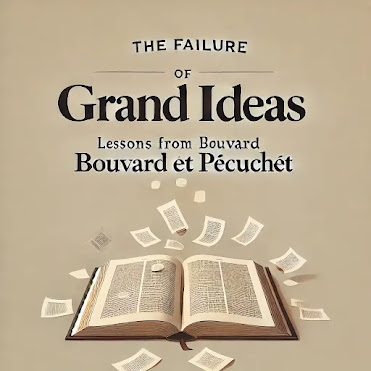The Failures of Grand Ideas: A Lesson from Bouvard et Pécuchet by Gustave Flaubert
In the 19th century, there was a shift in how people thought about the world. After the Enlightenment, which focused on reason and logic, a new movement called Romanticism took hold. Romantic thinkers were no longer content with only science and reason. They turned to the mysteries and dramatic stories of Christianity, with their themes of life and death, creation and destruction, heaven and hell. They believed these old, powerful ideas could help guide the future, but they wanted to reshape them in ways that made sense for their time.
One such idea that came up during the Romantic era was the belief that Europe could be "saved" or renewed by learning from Asia. Some thinkers, like Friedrich Schlegel and Novalis, believed that studying Indian culture and religion could help Europe overcome its problems, like materialism and political issues. They thought that by understanding Asia, Europe could be reborn, just like the Biblical idea of death and resurrection. This idea of a "regenerated" Europe, shaped by Asia’s wisdom, became a powerful Romantic vision.
In his novel Bouvard et Pécuchet, Gustave Flaubert humorously critiques this vision. He presents two characters, Bouvard and Pécuchet, who think they can solve all the world's problems by learning about different subjects like science, literature, history, and even the ideas from Asia. They think that by understanding these grand ideas, they can improve their lives and make the world a better place. But Flaubert shows that, like many people with big ideas, they are often clueless about the real world.
Bouvard and Pécuchet’s journey through different fields of knowledge is full of disappointments. They begin with high hopes but end up failing in nearly everything they try. For example, when they believe that studying Asia will save Europe, they don’t understand the true complexities of the cultures they are learning about. They only see them as tools to make their European vision come true. Flaubert mocks their narrow view, showing that these ideas are more about their own desires than understanding the reality of other places or cultures.
Flaubert also critiques the way people in the 19th century, like Bouvard and Pécuchet, tried to apply big, abstract ideas to the real world without thinking about the consequences. In one part of the novel, the characters take up science, believing that it can explain everything. But they are so wrapped up in their theories that they fail to see how complex the real world is. They believe that Europe and Asia can simply come together, but they don’t understand that the cultures and histories of these regions are far more complicated than their simple ideas suggest.
By the end of the novel, Bouvard and Pécuchet give up trying to change the world through their knowledge. Instead, they resort to simply copying ideas from books without thinking critically about them. This marks the end of their journey: from enthusiastic dreamers to passive repeaters of ideas. Flaubert is showing that while grand ideas are often appealing, they are not always practical or helpful. The failure of Bouvard and Pécuchet to apply their knowledge to the real world is a warning about the dangers of ignoring reality and just copying ideas mindlessly. Through the story, Flaubert teaches us an important lesson: big ideas, especially those that try to reshape the world, often fail when they don’t take the complexity of reality into account. Bouvard and Pécuchet’s journey shows how people with grand visions often ignore the details and realities of the world, leading to failure. Flaubert’s mockery of their efforts reminds us that while it's easy to be swept up in big theories and ideas, the real world is much messier and harder to change.
In the end, Bouvard et Pécuchet offers a fascinating look at the limitations of knowledge and the human tendency to get caught up in grand ideas without understanding the reality they are trying to change. It serves as a reminder that knowledge, when not applied thoughtfully, can become empty repetition, and that real change requires a deeper understanding of the world around us.
This critique of grand ideas and their failures connects to the broader Romantic movement, which, despite its noble aims, often ignored the complexities of real life. Flaubert’s novel challenges us to think critically, to question ideas, and to be aware of how our own biases and assumptions shape our understanding of the world.
Note: This blog post is based on ideas from the book Orientalism by Edward W. Said. The book explores how Western writers and scholars have often misunderstood and misrepresented the East. I hope this summary helps readers see some key points and understand the context behind these views.


%20standing%20with%20an%20open%20book%20in%20hand,%20gazi.webp)

Comments
Post a Comment